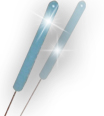|
| ||||||||||||||||||||||||||||||||||||
| ||||||||||
What is it?
Quercetin is a type of plant-based chemical, or phytochemcial, known as a flavanoid believed to contain anti-inflammatory and antioxidant
properties. Plants containing flavonoids are used as a traditional medicine in many cultures. Good sources of quercetin include apples,
onions, teas and red wines. Many men suffering from prostate problems can benefit from quercetin since it is found to reduce swelling of
the prostate gland. It is also a natural antihistamine that may relieve allergic symptoms and asthma symptoms. The anti-inflammatory
properties may reduce pain associated with arthritis. It is also found to reduce symptoms of fatigue, depression and anxiety. Studies done
in cell cultures have shown that quercetin can slow the growth of cancer cells, particularly colon cancer. This is due to its antioxidant and
anti-inflammatory properties.
Other Names:
Quercetin may also be called sophretin, meletin or bioflavanoid.
How Does it Work?
Quercetin is quickly broken down when digested, but it is not found in the bloodstream. The compounds that are created by the digestion
of quercetin have been shown to be beneficial to the treatment of a number of physical problems including prostate cancer, asthma, heart
disease and is even looked at for its anti-ageing possibilities.
Quercetin contains powerful antioxidants, which protect the all the body’s cells from free radical damage. When toxins enter your body
(chemicals from food, pollutants in the air, alcohol and cigarette smoke) or when cells naturally use oxygen, your body produces “free
radicals.” Free radicals cause oxidative damage—the chemical reaction that weakens and damages the body’s cells. Every muscle, organ
and bone in the body is made of cells, so if the cells are not functioning properly, a serious health issue could arise. Antioxidants are
substances and nutrients in food that slow, prevent and reverse this cell damage to keep the body as healthy as possible. That includes
keeping the metabolism moving at a steady pace, your energy at a consistent level, and your immune system strong.
Click here to schedule an appointment in Queens or Manhattan or/and send alternative medicine and healing
without medications acupuncture specialist your health question or call "Feel Good Acupuncture" at 646-327-7267.
without medications acupuncture specialist your health question or call "Feel Good Acupuncture" at 646-327-7267.
Quercetin:
Quercetin as an antioxidant has been shown to have significant anti-tumor, anti-allergic and anti-inflammatory effects, and can stop the growth of prostate cancer cells.
According to a study by the Department of Microbiology and Immunology at the State University of New York at Buffalo, quercetin was able to successfully inhibit the growth of
the highly dangerous PC-3 and DU-145 prostate cancer lines. Quercetin was able to suppress nine different tumor genes by more than 50 percent.
For allergies, quercetin might work by inhibiting the release of histamine, which leads to common symptoms of an allergic reaction.
Prostate Health Why is it Beneficial?
Since quercetin has potent antioxidant powers, it is beneficial for the treatment of numerous ailments and health problems:
•Certain cancers including breast and prostate cancer
•Chronic prostatitis (inflammation of the prostate)
•Heart disease
•Allergies
•Asthma
•Chronic Fatigue
•Anti Ageing including wrinkles, fine lines and dry skin
•High Cholesterol
•Cataracts
•Diabetes
•Hardening of Arteries
According to a 1999 study reported in the Journal of Urology, 82 percent of men who took 500 milligrams of quercetin twice daily reported at least a 25 percent improvement
in symptoms caused by prostatitis, including pelvic pain. During the study, none of the men experienced any negative side effects from taking quercetin. A 2007 study
reported in the American Journal of Epidemiology reports smokers who took quercetin daily also developed pancreatic cancer less often compared to smokers who did not
take any flavanoid-enhanced supplements. The University of Maryland also names quercetin as a possible alternative treatment for Interstitial cystitis because several studies
show it reduces urgent urges to urinate, which are caused by the disease. This is also a common symptom of benign prostatic hypertrophy (BPH) or enlarged prostate.
Studies have also shown that quercetin may also be a potential solution to cardiovascular disease, a leading cause of death in the United States. The study focused on the
effects of quercetin on overweight people with high cardiovascular risk. Quercetin was tested on a group of 93 overweight and obese people ranging from 25-65 years old.
Each individual was given only 150mg of quercetin per day, while regular quercetin capsules are weighted at 500mg and can be taken up to three times a day. Over the six-
week trial period of taking quercetin in smaller doses, the capsule was found to lower blood pressure and significantly prevent damage to LDL cholesterol. Since only
damaged LDL cholesterol causes plaque build up, quercetin was shown to prevent cardiovascular disease overall.
Other health benefits include quercetin’s ability to block an enzyme that leads to the accumulation of sorbitol, which has been linked to nerve, eye, and kidney damage in
those with diabetes.
According to a study by the Department of Microbiology and Immunology at the State University of New York at Buffalo, quercetin was able to successfully inhibit the growth of
the highly dangerous PC-3 and DU-145 prostate cancer lines. Quercetin was able to suppress nine different tumor genes by more than 50 percent.
For allergies, quercetin might work by inhibiting the release of histamine, which leads to common symptoms of an allergic reaction.
Prostate Health Why is it Beneficial?
Since quercetin has potent antioxidant powers, it is beneficial for the treatment of numerous ailments and health problems:
•Certain cancers including breast and prostate cancer
•Chronic prostatitis (inflammation of the prostate)
•Heart disease
•Allergies
•Asthma
•Chronic Fatigue
•Anti Ageing including wrinkles, fine lines and dry skin
•High Cholesterol
•Cataracts
•Diabetes
•Hardening of Arteries
According to a 1999 study reported in the Journal of Urology, 82 percent of men who took 500 milligrams of quercetin twice daily reported at least a 25 percent improvement
in symptoms caused by prostatitis, including pelvic pain. During the study, none of the men experienced any negative side effects from taking quercetin. A 2007 study
reported in the American Journal of Epidemiology reports smokers who took quercetin daily also developed pancreatic cancer less often compared to smokers who did not
take any flavanoid-enhanced supplements. The University of Maryland also names quercetin as a possible alternative treatment for Interstitial cystitis because several studies
show it reduces urgent urges to urinate, which are caused by the disease. This is also a common symptom of benign prostatic hypertrophy (BPH) or enlarged prostate.
Studies have also shown that quercetin may also be a potential solution to cardiovascular disease, a leading cause of death in the United States. The study focused on the
effects of quercetin on overweight people with high cardiovascular risk. Quercetin was tested on a group of 93 overweight and obese people ranging from 25-65 years old.
Each individual was given only 150mg of quercetin per day, while regular quercetin capsules are weighted at 500mg and can be taken up to three times a day. Over the six-
week trial period of taking quercetin in smaller doses, the capsule was found to lower blood pressure and significantly prevent damage to LDL cholesterol. Since only
damaged LDL cholesterol causes plaque build up, quercetin was shown to prevent cardiovascular disease overall.
Other health benefits include quercetin’s ability to block an enzyme that leads to the accumulation of sorbitol, which has been linked to nerve, eye, and kidney damage in
those with diabetes.


